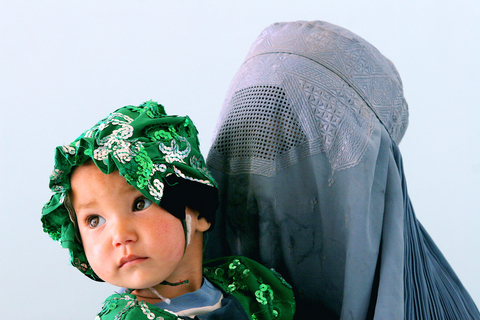A baby born in the developing world must fight to survive right from the start, with up to 2 million deaths occurring in the first 24 hours of life every year, according to a global report on mother and infant mortality.
Many of those deaths could easily be prevented with cheap interventions, such as knit caps to keep newborns warm or clean blades to cut umbilical cords, according to the analysis released yesterday by the US-based group, Save the Children.
Expectant mothers also do not fare well in poor countries, with half a million women dying annually from complications during pregnancy or birth, often because they have no care before, during or after their babies are born, the report said. A huge number of women give birth at home alone or with no skilled attendant.

PHOTO: AP
"In most of the developing world, childbirth is a dance with death for both mother and baby, even though 70 percent of those deaths could be prevented," said co-author Anne Tinker, director of the organization's Saving Newborn Lives Initiative. "The secret is really knowledge."
The 50-page report released ahead of Mother's Day compiles data from the world's nations as well as the WHO and UNICEF. It presents a bleak look at the challenges pregnant women and newborns face in impoverished countries, where up to 99 percent of deaths occur -- illustrating the wide gap between rich and poor nations.
For instance, one in every five women in sub-Saharan Africa has lost a newborn, along with one in every seven women in South Asia. Some 4 million babies die in their first month of life each year -- the total number born annually in the US.
Out of the 78 low and middle-income countries examined, Liberia had the highest newborn mortality rate with 65 out of 1,000 babies dying in a country where forced teen marriages are common and one out of 16 women dies during pregnancy or childbirth.
Liberia was closely followed by Afghanistan, Sierra Leone, Iraq, Pakistan and Ivory Coast -- countries known for conflict and widespread violence against women.
In the Afghan village of Rabat north of Kabul, a woman said that her seventh child, a daughter, died just 14 days after birth two months ago.
"I am not sure why she died, but she was not able to breast-feed and I was not receiving prenatal medical care," said Nagis, who uses just one name.
Like all of her children, the baby was delivered at home because there was no female doctor or midwife to aid her at the clinic.
"It is generally considered as taboo in the community for men to treat women, especially during pregnancy," she said.
Dr Noorullah Moussazai, who runs a local health clinic that recently set up a mother and child health program using trained midwives, said, "Consultations by male doctors remain a problem for obstetrical and gynecological procedures."
In contrast, Vietnam and Colombia tied for the lowest newborn mortality rate with 12 out of 1,000 deaths. They were followed by Mexico, Brazil, Jordan, Kazakhstan and Nicaragua.
Vietnam and Colombia both boasted high percentages of prenatal care, births involving a skilled attendant and higher levels of education.
In the industrialized world, Japan had the lowest newborn mortality rate of 1.8 per 1,000, followed by the Czech Republic, Finland, Iceland and Norway.
The US, on the other hand, had one of the highest newborn death rates -- five in 1,000 -- in the developed world. It tied with Hungary, Malta, Poland and Slovakia. Only Latvia came in lower out of 33 countries examined.
The report highlights the need for better education and nutrition among expectant mothers, and the importance of breast-feeding.
It also offers cost-effective options, including tetanus shots, which cost about US$0.40, to protect moms and babies against infection, especially from dirty instruments that may be used during birth.
The study found that most newborn deaths result from some type of infection, such as pneumonia or diarrhea, or complications related to premature births.

PARLIAMENT CHAOS: Police forcibly removed Brazilian Deputy Glauber Braga after he called the legislation part of a ‘coup offensive’ and occupied the speaker’s chair Brazil’s lower house of Congress early yesterday approved a bill that could slash former Brazilian president Jair Bolsonaro’s prison sentence for plotting a coup, after efforts by a lawmaker to disrupt the proceedings sparked chaos in parliament. Bolsonaro has been serving a 27-year term since last month after his conviction for a scheme to stop Brazilian President Luiz Inacio Lula da Silva from taking office after the 2022 election. Lawmakers had been discussing a bill that would significantly reduce sentences for several crimes, including attempting a coup d’etat — opening up the prospect that Bolsonaro, 70, could have his sentence cut to

A powerful magnitude 7.6 earthquake shook Japan’s northeast region late on Monday, prompting tsunami warnings and orders for residents to evacuate. A tsunami as high as three metres (10 feet) could hit Japan’s northeastern coast after an earthquake with an estimated magnitude of 7.6 occurred offshore at 11:15 p.m. (1415 GMT), the Japan Meteorological Agency (JMA) said. Tsunami warnings were issued for the prefectures of Hokkaido, Aomori and Iwate, and a tsunami of 40cm had been observed at Aomori’s Mutsu Ogawara and Hokkaido’s Urakawa ports before midnight, JMA said. The epicentre of the quake was 80 km (50 miles) off the coast of

China yesterday held a low-key memorial ceremony for the 1937 Nanjing Massacre, with Chinese President Xi Jinping (習近平) not attending, despite a diplomatic crisis between Beijing and Tokyo over Taiwan. Beijing has raged at Tokyo since Japanese Prime Minister Sanae Takaichi last month said that a hypothetical Chinese attack on Taiwan could trigger a military response from Japan. China and Japan have long sparred over their painful history. China consistently reminds its people of the 1937 Nanjing Massacre, in which it says Japanese troops killed 300,000 people in what was then its capital. A post-World War II Allied tribunal put the death toll

A passerby could hear the cacophony from miles away in the Argentine capital, the unmistakable sound of 2,397 dogs barking — and breaking the unofficial world record for the largest-ever gathering of golden retrievers. Excitement pulsed through Bosques de Palermo, a sprawling park in Buenos Aires, as golden retriever-owners from all over Argentina transformed the park’s grassy expanse into a sea of bright yellow fur. Dog owners of all ages, their clothes covered in dog hair and stained with slobber, plopped down on picnic blankets with their beloved goldens to take in the surreal sight of so many other, exceptionally similar-looking ones.